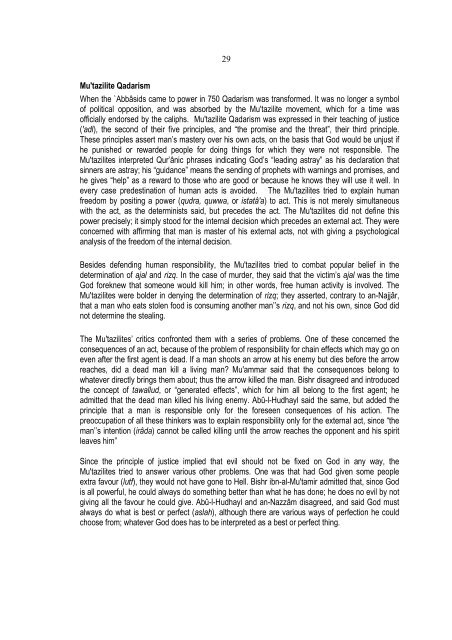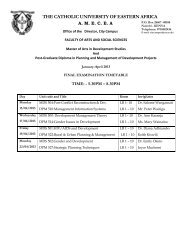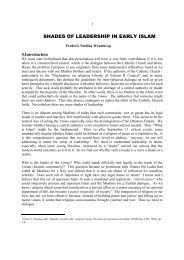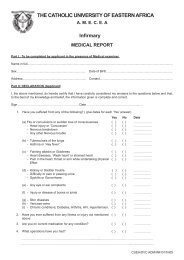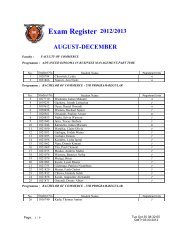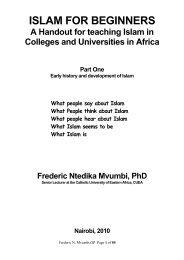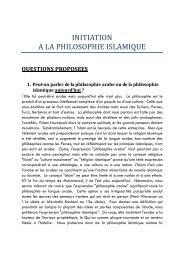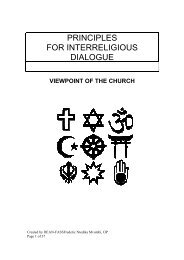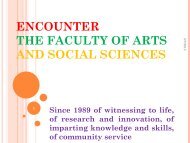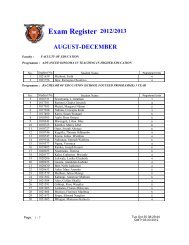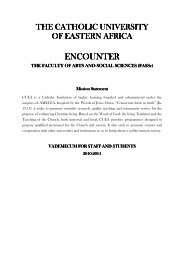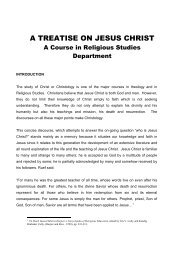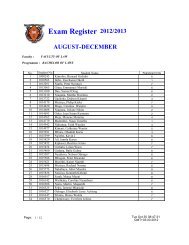INTRODUCTION TO ISLAMIC THEOLOGY.pdf - CUEA
INTRODUCTION TO ISLAMIC THEOLOGY.pdf - CUEA
INTRODUCTION TO ISLAMIC THEOLOGY.pdf - CUEA
Create successful ePaper yourself
Turn your PDF publications into a flip-book with our unique Google optimized e-Paper software.
29Mu'tazilite QadarismWhen the `Abbâsids came to power in 750 Qadarism was transformed. It was no longer a symbolof political opposition, and was absorbed by the Mu'tazilite movement, which for a time wasofficially endorsed by the caliphs. Mu'tazilite Qadarism was expressed in their teaching of justice('adl), the second of their five principles, and “the promise and the threat”, their third principle.These principles assert man’s mastery over his own acts, on the basis that God would be unjust ifhe punished or rewarded people for doing things for which they were not responsible. TheMu'tazilites interpreted Qur’ânic phrases indicating God’s “leading astray” as his declaration thatsinners are astray; his “guidance” means the sending of prophets with warnings and promises, andhe gives “help” as a reward to those who are good or because he knows they will use it well. Inevery case predestination of human acts is avoided. The Mu'tazilites tried to explain humanfreedom by positing a power (qudra, quwwa, or istatâ'a) to act. This is not merely simultaneouswith the act, as the determinists said, but precedes the act. The Mu'tazilites did not define thispower precisely; it simply stood for the internal decision which precedes an external act. They wereconcerned with affirming that man is master of his external acts, not with giving a psychologicalanalysis of the freedom of the internal decision.Besides defending human responsibility, the Mu'tazilites tried to combat popular belief in thedetermination of ajal and rizq. In the case of murder, they said that the victim’s ajal was the timeGod foreknew that someone would kill him; in other words, free human activity is involved. TheMu'tazilites were bolder in denying the determination of rizq; they asserted, contrary to an-Najjâr,that a man who eats stolen food is consuming another man’’s rizq, and not his own, since God didnot determine the stealing.The Mu'tazilites’ critics confronted them with a series of problems. One of these concerned theconsequences of an act, because of the problem of responsibility for chain effects which may go oneven after the first agent is dead. If a man shoots an arrow at his enemy but dies before the arrowreaches, did a dead man kill a living man? Mu'ammar said that the consequences belong towhatever directly brings them about; thus the arrow killed the man. Bishr disagreed and introducedthe concept of tawallud, or “generated effects”, which for him all belong to the first agent; headmitted that the dead man killed his living enemy. Abû-l-Hudhayl said the same, but added theprinciple that a man is responsible only for the foreseen consequences of his action. Thepreoccupation of all these thinkers was to explain responsibility only for the external act, since “theman’’s intention (irâda) cannot be called killing until the arrow reaches the opponent and his spiritleaves him”Since the principle of justice implied that evil should not be fixed on God in any way, theMu'tazilites tried to answer various other problems. One was that had God given some peopleextra favour (lutf), they would not have gone to Hell. Bishr ibn-al-Mu'tamir admitted that, since Godis all powerful, he could always do something better than what he has done; he does no evil by notgiving all the favour he could give. Abû-l-Hudhayl and an-Nazzâm disagreed, and said God mustalways do what is best or perfect (aslah), although there are various ways of perfection he couldchoose from; whatever God does has to be interpreted as a best or perfect thing.


